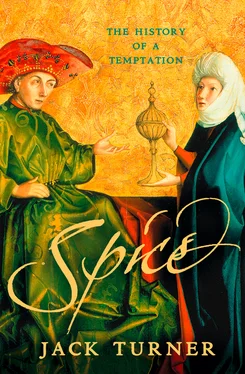Harsh winter and torrid summer never rage.
An eternal spring puts forth the purple flowers of roses.
Lilies shine white, and the crocus red, exuding balsam.
The meadows are verdant, the crops sprout,
Streams of honey flow, exhaling spice and aromatic wine.
Fruits bang suspended, never to fall from the flowering groves.
That paradise smelled of spices was, for Damian, something more than a passing fancy. His words and spiced imagery alike were lifted directly from the Apocalypse of Peter, an early Christian work, now discarded as apocryphal but widely read in the Middle Ages. Damian himself returned to the theme in a series of letters to his friend and fellow cleric St Hugh (1024–1109), abbot of the great Benedictine monastery of Cluny, at the time the intellectual and spiritual centre of Western Christendom. To Damian, the shelter of Cluny’s cloister was a ‘Paradise watered by the rivers of the four Evangelists … a garden of delights sprouting the manifold loveliness of roses and lilies, sweetly smelling of honeyed fragrances and spices’.
The belief in spices’ unearthly origins is crucial to understanding their charm – and their value. For if paradise and its spices were fair, so the world in which Damian lived was, so far as he was concerned, irredeemably foul. Among his other works is the Book of Gomorrah, one of the bleakest visions of humanity ever penned. In Damian’s eyes the entire race was mired in baseness, its sole, slender hope a Church that was itself sunk in moral squalor and loathsome homosexuality. The priesthood was addicted to every variant of rampant lust, racked by ‘the befouling cancer of sodomy’. Bishoprics were bought and sold, lecherous priests openly took wives and handed on their livings to their bastard offspring, and a corrupt and venal papacy was despised and disregarded by the secular powers. From his retreat in the wilderness Damian looked out on a world populated by a race of degenerate Yahoos. Paradise seemed a long way away.
Yet its aromas were there, as it were, right under his nose. Spices were a taste of paradise in a world submerged in filth; they were far more than mere foodstuffs. And this reputation endured even as knowledge of the wider world expanded and travellers penetrated, glacier-pace, some of the dark spaces on the map. Jean, sire de Joinville ( c. 1224–1317) provided a fairly typical explanation of the spices’ arrival from the East. In his day, and long before and after, Egypt was the prime intermediary between the Near and the Far East, and as such Europe’s prime supplier of spice. After the capture of the crusader army in 1250 Joinville was held in an Egyptian dungeon as a prisoner of the sultan, awaiting the payment of a hefty ransom. Though he had seen the Nile carry off the bloated bodies of his companions, mown down by plague after the battle of al-Mansurah, he was prepared to believe in the river’s unearthly origins, and that it might carry more pleasant flotsam:
Before the river enters Egypt, the people who are so accustomed cast their nets in the river in the evening; and when morning comes, they find in their nets those goods sold by weight that they bring to this land, that is, ginger, rhubarb, aloes wood, and cinnamon. And it is said that these things come from the terrestrial Paradise; for the wind blows down the dead wood in this country, and the merchants here sell us the dead wood that falls in the river.
This from someone who, unlike the overwhelming majority of Europeans, had wet his feet in its waters.
And yet Joinville’s account was something more than a fabulous yarn spun by a returning traveller out to dazzle the folks back home. Judged by the standards of the day, his passed for relatively informed opinion; he had moreover a willing audience, many of whom would have seen it as impious to believe otherwise. For although no one had been there, few doubted the existence of the terrestrial paradise from where, according to an ancient tradition, some of the fruits of a lost Eden still trickled through to a fallen humanity: ‘Whatever fragrant or beautiful thing that comes to us is from that place,’ said St Avitus of Vienne ( c .490–518). That spices grew in Eden’s garden of delights was no more than the literal truth, inasmuch as the vocabulary for delights and spices was one and the same. The connection was explained by St Isidore of Seville ( c .560–636) in what was possibly early-medieval Christendom’s single most influential description of the East and the terrestrial paradise: ‘Paradise … is called in Hebrew “Eden”, which is translated into our own language as Deliciae, the place of luxury or delight [equally, the exotic delights and dainties themselves]. Joined together, this makes “Garden of Delights”; for it is planted with every type of wood and fruit-bearing tree, including the Tree of Life. There is neither cold nor heat but eternal spring.’ Unfortunately for humanity, however, this paradise was hedged in with ‘flames like swords, and a wall of fire reaching almost to the sky’.
As Joinville appreciated, with such barriers separating supply and demand, the exact means of that transfer were necessarily obscure, and the source of much speculation. According to the Book of Genesis, in Eden was the fountain that ‘went up from the earth, and watered the whole face of the ground’. Translated to medieval cosmography, biblical exegesis held that this fountain was the source of the Nile, Euphrates, Tigris and Phison (or, to some, the Ganges). St Augustine of Hippo (354–430) concluded that the rivers circumvented the flames by passing underground before re-emerging. It was via these rivers that spices arrived.
Thus when Joinville looked on the waters of the Nile and came up with his colourful explanation of its harvest, he was merely reconciling the biblical truth to what he had seen with his own eyes. By unknown means and ferried by unknown hands, on streams flowing from another world, spices arrived from a place known only from Bible and fable, washing up in the souks of Cairo and Alexandria and thence to the markets of Europe like so much cosmic driftwood.
Or, perhaps more to the point, like gold dust. For mystery meant profitability. In a stroke of medieval marketing genius, there was even a spice that took its name from its purported origins, the grains of paradise that appear in spicers’ account books from the thirteenth century on. In medieval times grains of paradise, or simply ‘grains’, cost more than the black pepper of India. Sharp to the taste and now confined to speciality shops, the spice is in fact the fruit of Aframomum melegueta (also Aframomum granumparadisi), a native of West Africa, where it was purchased by Portuguese traders on their voyages down around the continent’s western bulge, or else freighted by caravan across the Sahara, along the gold and slave routes of Timbuktoo. By the time ‘grains’ arrived in Europe their credentials were burnished and their origins forgotten. Paradise made for as plausible an origin as any other.
That spices have all but lost their lustre in the twenty-first century is in large measure because much of the mystery has gone out of the trade and the places where they grow. Paradise survives not as a place, but as a symbol. Yet for centuries spices and paradise were inseparable, joined together in a relationship whose durability was guaranteed by the fact that it could not be disproved. The few known facts added up to a baffling puzzle that invited colourful explanations. Hardly anyone involved in the trade knew who or what lay beyond the last transaction, and much the same held true all along the spice routes. None but the first few handlers of these transactions had any idea where their goods originated; few had any idea where they were bound; and none could view the system in its entirety. Trade was a piecemeal business, passed on from one middleman to another. Perhaps the greatest wonder of the system is that it existed at all.
Читать дальше











